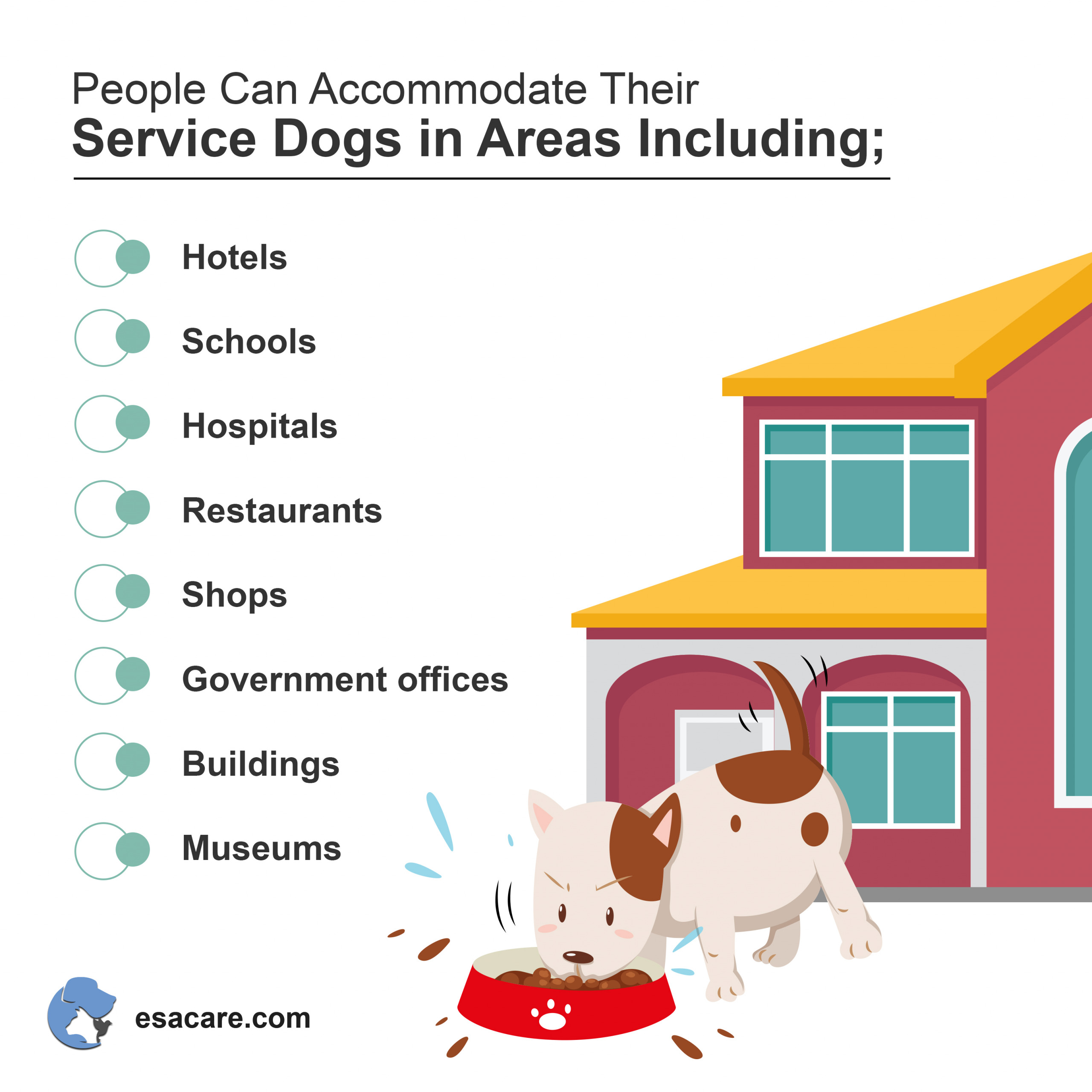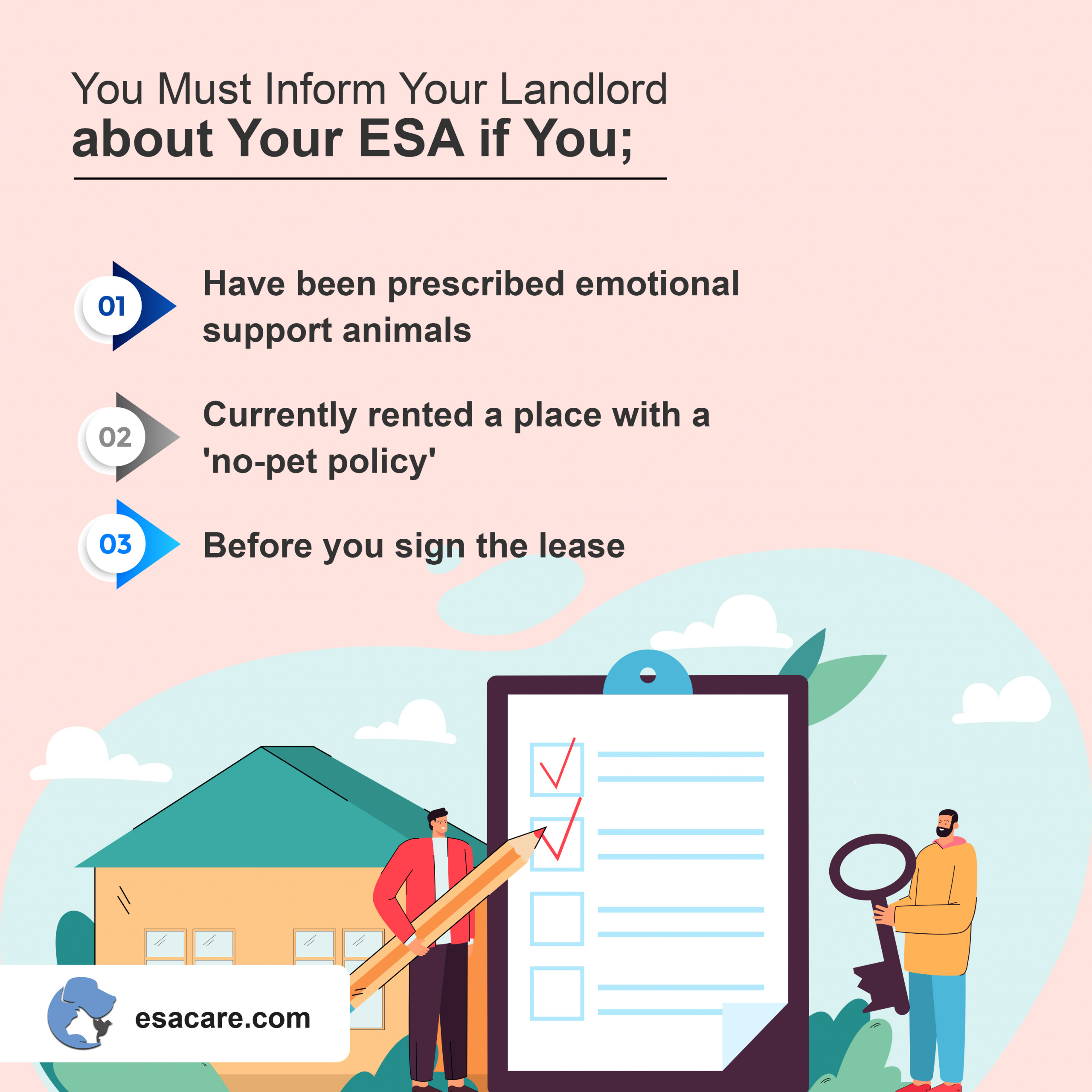ESA Rules for Landlords and Tenant: All You Should Know About
Individuals with a disability can easily access emotional support animals if they qualify for the ESA letter from a doctor.
Hence, it is imperative to have a clear understanding of ESA rules for landlords and tenants.
Renew your ESA Letter with us – Click the button below.
If ESA rules for landlords and tenants are adequately fulfilled, you can rent the place of your choice to stay with your emotional support animal without paying any extra fees.
Keep reading till the end to get a complete understanding of ESA rules for landlords and renting policies.
Let’s get down!
Table of Contents
1. What Are the ESA Rules for Landlords?
Although emotional support animals and service animals are not the same, both types of assistance animals have similar legal protection rights.
ESA laws 2021 housing:
There are three federal laws for emotional support animals:
1. The Federal Fair Housing Act (FHA)
The FHA was initially designed to stop discrimination against individuals in property renting and buying activities based on age, sex, color, national origin, religion, etc.
The FHA ESA laws protect individuals with disability against the discrimination of landlords.
Is your ESA protected under FHA ESA laws?
ESA laws 2021 housing for ESA owners under the Fair Housing Act are as follows;
- Individuals with a disability can keep their ESA at home even if the housing complex does not allow pets.
- Exemption on weight and breed restrictions on pets from the housing complex.
- Pet-related fees exemption, including cleaning fees and additional rents.
What types of housing are covered under the Fair Housing Act?
FHA covers most types of housing, while there are still some exceptions.
The housing exempt from the FHA ESA laws include;
- Buildings that have more than four units and are occupied by owners
- Houses under religious organizations and private clubs that limit members occupancy
- Homes (single-family) rented and sold by the owners without agents
2. Americans with Disability Act (ADA)
Americans with Disability Act (ADA) is a law acknowledging the civil rights of individuals with a disability to ban any restrictions and discrimination regarding housing, jobs, schools, transportation, public and private places.
The rights given by the ADA to service animal owners include;
ADA has given prominent rights to the owners of service animals, such as; the service dogs would be accommodated everywhere.

Service Dog Accommodation
3. Air Carrier Access Act (ACCA)
Under the Air Carrier Access Act (ACCA), emotional support animals can travel with their owners depending on the ESA travel laws and airlines policies. It gives people with mental disabilities a significant edge to travel with their service animals to many different places and even stay with their support animals at pet-friendly Airbnbs and properties.
However, the ACCA changed its policies in 2021, stating that ESA would be considered pets and no service animals, and the Department of Transportation allowed air carriers to exclude ESAs from the cabin and allow weight restrictions adding extra fees depending on the airline’s policies.
What can a landlord ask about an emotional support animal?
Under the ESA rules for landlords, they can show their concerns towards the emotional support animals if they have any associated health and safety risks. The landlord can also ask for documents from a licensed medical professional such as; a physician, therapist, social worker, or mental health expert. In addition, the ESA must be trained to work with its owner and ease out any symptoms of the disability.
Landlords are also allowed to verify the ESA letter following the ESA rules for landlords. The ESA letter should be 100% authentic and should come from the letterhead of a licensed mental health professional. The landlord might even ask about the email address, contact number, and other contact information of the licensed medical professional.
ESA rules for landlords also allow the landlord to ask for a Reasonable Accommodation Form completed by your therapist if you don’t have one already.
Do you have to pay pet rent for ESA?
Ever since the emotional support animals are no longer considered pets under the ESA housing laws, they are instead regarded as assistance animals, hence why you don’t have to pay pet rent or additional charges for your ESA. Landlords are not allowed to fundamentally alter the ESA laws.
Keeping your ESA is free of charge, and tenants do not have to pay any pet deposits. However, the landlord may only charge extra if there has been any house property damage by the ESA in terms of damage to common areas, damage to dwellers, or damage to a housing unit.
Do you have to show an emotional support animal letter to the landlord?
Showing a valid emotional support animal letter to the landlord is a must!
The landlord can ask for the validity of the ESA letter and the authentication of the licensed medical professional, and the validity of their contact number.
Book an Appointment with ESACare, do not hesitate to contact us.
Can you have more than one ESA in a rental property?
There are no specific ESA rules for landlords restricting or fixing the number of ESA in a property. You can certainly have more than one ESA in a rental property. As per the FHA ESA laws, the landlords need to make necessary accommodations for people with their emotional support animals.
ESA tenants and landlords laws for states in the USA
The federal housing laws stated by the Fair Housing Act are applicable in almost all the states of America, but there are states with specific ESA laws housing laws. Generally, the states may have different ESA-related laws for university students and ESA-related regulations associated with employment.
States of America with specific ESA laws;
| States | ESA Tenant-Landlord Laws |
| California |
|
| Florida |
|
| Texas |
|
| New York |
|
Don’t let stress get to you – apply for an ESA letter now!
2. Service Animals Vs. Emotional Support Animals Housing Laws and Difference
Although there are significant similarities between service animals and emotional support animals, as both are associated with specific functions to aid individuals, there are still many differences.
Service animals vs. emotional support animals differences
| Service animals | Emotional support animals |
| Service animals are specifically trained to perform specific tasks and functions | An emotional support animal doesn’t require specialized training for specific tasks |
| Service animals can’t be solely companions | ESA can be companions solely |
| Service animals are usually assigned for physical, intellectual, and emotionally handicapped people | Emotional support animals are usually assigned to individuals with disability related to mental health by health professionals |
Specialized training of the service animals include;
|
ESA may or may not be trained to perform jobs and tasks for people suffering from;
|
| Covered under major legal protections | Does not come under major legal protections |
| The access of the service animals cannot be denied legally into spaces with their owners and handlers | ESA is usually limited to housing and air travel |
| Service dogs are allowed only | Many species of different animals are allowed i.e., dogs, cats, birds, etc |
Next,
Service animals vs. emotional support animals housing laws
There is a distinct difference between the housing laws related to service animals and emotional support animals. Both FHA and ADA cover the laws of service animals. Still, for emotional support animals, FHA’s rights are only protected under the ESA rules for landlords.
Service animals require rigorous training and formal registration. On the contrary, the emotional support animals do not require formal training but need an authentic ESA letter from a licensed health professional.
Emotional support animals give emotional assistance and companionship, whereas service animals can only be appointed for medical purposes.
3. When to Tell the Landlord about Emotional Support Animals?
Letting your landlord know about your emotional support animal is crucial to fulfilling the ESA rules for landlords; there are three situations in which you must tell your landlord about your ESA as soon as possible.
You must inform your landlord about your ESA. If you;
- Have been prescribed emotional support animals
- Currently rented a place with a ‘no-pet policy.’
- Before you sign the lease
Next,
How should you tell the landlord about your ESA before you sign the lease?
Follow the steps below to tell your landlord about your ESA:
Step 1: Start by notifying your landlord that you have an emotional support animal. There are many ways to inform your landlord about your ESA, such as; Emails, Fax, phone calls, or talking to them directly. Explain to them about your mental disability and let them know that you require an ESA.
Step 2: Present your ESA letter to your landlord. Under the FHA ESA laws, you are protected by the ESA rules for landlords as long as you have an authentic ESA letter from a certified mental health professional.
Step 3: If there is a no pet policy, your landlord can not evict you from renting their property due to ESA (but there can be other legal reasons other than ESA).

ESA Letter
How to Rent an Apartment With an Emotional Support Animal?
Emotional support animals are not ordinary pets; that is why the general rules of property renting do not apply to emotional support animals under the federal housing laws.
Understanding the ESA rules for landlords is essential if you want to take advantage of living with an ESA under the FHA ESA laws.
The steps below will guide you through the renting process of an apartment with your emotional support animal.
1. Get your ESA letter from a licensed professional: If you want your ESA accommodation process to go smoothly, then get your ESA letter from a licensed healthcare worker. Getting your ESA letter from a licensed professional will protect you from eviction under the ESA rules for landlords.
2. Inform your landlord about your ESA: Once you get your emotional support letter, the next thing is to inform your landlord about your ESA. Under the ESA rules for landlords, the property owner can not deny your ESA until or unless there are serious health threats.
3. Train your ESA to behave appropriately: Make sure that your ESA behaves correctly because, under certain conditions, your landlord may deny your ESA accommodation if it is a health or safety risk.
4. Know your rights as an ESA owner: Under the Fair Housing Act (FHA), your rights with your ESA in accommodations are incredibly protected by the ESA laws 2021 housing.
What are your legal rights to an ESA?
- The landlord must accept your ESA despite any discrimination of species
- Your landlord should take your animal despite any weight
- Your landlord must receive your animal despite any breed
Improve your mental health by keeping your ESA pet close by – Get your ESA certification today!
4. When Can a Landlord Legally Reject an ESA?
It is almost impossible for your landlord to reject your ESA under the federal housing law. Still, the landlord can reject your ESA under some specific factors protected by the ESA rules for landlords.
So,
When can a landlord deny an emotional support animal?
There are only two significant factors under which your landlord can reject your emotional support animals;
- If your emotional support animal damages the property
- If your emotional support animal is disruptive or a potential health and safety risk for other tenants
Other than the above-listed factors, your landlord can not reject your emotional support animals despite any reasons related to it.

ESA Landlords
What steps to take if your landlord rejects your emotional support animals?
Take the following steps if your landlord rejects your emotional support animal for any reasons other than those listed above;
- Your landlord might not be aware of the ESA rules for landlords, and that is why you will have to explain to them that rejecting your ESA is a violation of federal law.
- Present your legal documentation, including the medical reports from your licensed professional, as well as the authentic ESA letter.
- If your landlord still chooses to reject your ESA, file a discrimination report to the U.S. Department of Justice.
- File a discrimination complaint against your landlord
- You can sue your landlord, and they will be fined under federal law.
Next,
Can a landlord refuse a service dog?
The only case where a landlord can refuse your service dog is if you are not disabled or fail to prove and provide all the legal and authentic documentation for your disability and allowance of keeping a service dog.
What is the impact of an ESA animal destroying rental property?
If an ESA destroys the rental property, then the landlord has full authority to charge for the actual damage caused by the ESA. Other than that, under the Fair Housing Act, the landlord is allowed to deduct the expenses of the damage made by the ESA from the security deposit money of the tenant.
The Final Takeaway
Provided that you have an authentic ESA letter and you are aware of the ESA rules for landlords, you can easily rent a property of your choice with your ESA. Under the FHA and federal housing laws, you shouldn’t be finding any issues in legally staying with your ESA at a rental property. However, there are some specific terms to ensure that your landlord doesn’t evict you.
Staying with your ESA is only possible if you have an authentic ESA letter from a licensed mental health professional. Contact us right now at ESAcare at (833)916-0637 and book an appointment quickly to get your 100% authentic ESA letter from a certified mental health expert and enjoy the endless joy of staying with your ESA without any issues from your landlord.
Book an Appointment with ESACare, do not hesitate to contact us.










 347 5th Ave Suite 1402-112,
347 5th Ave Suite 1402-112,

Leave a Reply
Want to join the discussion?Feel free to contribute!